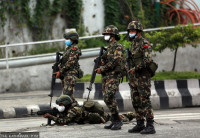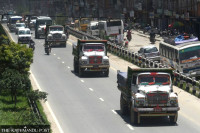National
Prime Minister Oli reaffirms Nepal’s commitment to transitional justice and climate action at UNGA
The prime minister highlights transitional justice progress and urges global action on climate change, emphasising the impact on Nepal’s Himalayas.
Post Report
Prime Minister KP Sharma Oli has stressed Nepal’s commitment to resolving its long-standing transitional justice issues.
Addressing the 79th session of the United Nations General Assembly in New York, the prime minister outlined Nepal’s efforts to address the transitional justice process.
“Parliament has passed a Transitional Justice bill to settle the issue once and for all,” Prime Minister Oli told the Assembly, underscoring his government’s commitment to bringing closure to the conflict era.
The new law, he said, is designed to uphold victims’ rights by ensuring they receive truth and justice, while also providing a path for reconciliation.
Prime Minister Oli said that reparations and reconciliation are crucial to healing the “wounds and scars” left by the conflict. “We will use reparations and reconciliation to heal the wounds and scars of the conflict period,” he said.
The prime minister reaffirmed his government’s intention to expedite the peace process and secure political stability, noting that the transitional justice mechanism is central to this effort.
Oli expressed appreciation for the international support Nepal has received in dealing with its transitional justice issues, including assistance from the United Nations. “We appreciate support from the international community, including the UN system, in this regard,” he said.
In addition to transitional justice, Prime Minister Oli highlighted the escalating threat of climate change, which he described as one of the most pressing global challenges.
He called for “climate justice” for nations like Nepal, which contribute little to global emissions but bear a disproportionate share of the consequences.
Oli drew attention to the alarming rate at which Nepal’s Himalayan glaciers—often referred to as the “Third Pole”—are melting.
“This loss of ice not only threatens water availability for billions of people in downstream countries but also poses a significant environmental risk, he said.
“Of utmost concern is the alarming rate at which the pristine Himalayas, often referred to as the Third Pole, are losing their vast snow reserves.”
The prime minister said that Nepal’s Himalayas play a critical role in regulating global climate patterns, with their snow-fed rivers flowing into major oceans and contributing to climate stability.
Prime Minister Oli reiterated Nepal’s call for stronger international action on the issue, including the need for a dedicated “Loss and Damage” fund to support countries like Nepal in implementing climate-resilient measures and infrastructure.
He also called for greater focus on the mountain agenda in international climate negotiations, pointing out that Nepal’s mountainous regions are vital not only for the local population but for the global ecosystem.
“Nepal’s Himalayas, as a natural climate stabiliser, help maintain a cooling system in a region situated in the hottest zone of the planet,” he said, urging global leaders to pay greater attention to the unique challenges faced by mountainous nations in the fight against climate change.
Reaffirming Nepal’s commitment to the Paris Agreement, Oli outlined the country’s target to achieve net zero carbon emissions by 2045, five years ahead of the global goal. “Nepal is steadfast in its commitment to the Paris Agreement and aims to achieve net zero by 2045,” he said, stressing that collective global efforts are required to tackle the climate crisis effectively.
He also reaffirmed Nepal’s commitment to international peace, noting the country’s contributions to United Nations peacekeeping missions and its advocacy for global disarmament.




 9.92°C Kathmandu
9.92°C Kathmandu














